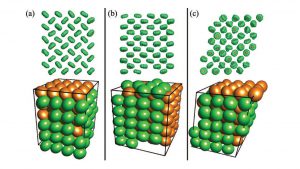G. Bautista-Carbajal, A. Moncho-Jordá, G. Odriozola
In recent work we revisited the phase diagram of hard ellipsoids of revolution (spheroids) by means of replica exchange Monte Carlo simulations. This was done by setting random initial configurations, and allows to confirm the formation of sm2 crystal structures at high densities [P. Pfleiderer and T. Schilling, Phys. Rev. E 75, 020402 (2007)] for large anisotropies and stretched-fcc for small anisotropies. In this work we employed the same technique but setting the starting cells as sm2 crystal structures having the maximum known packing density [A. Donev, F. H. Stillinger, P.M. Chaikin, and S. Torquato, Phys. Rev. Lett. 92, 255506 (2004)]. This procedure yields a very rich behavior for quasi-spherical oblates and prolates. These systems, from low to hig h pressures, show the following phases: isotropic fluid, plastic solid, stretched-fcc solid, and sm2 solid. The first three transitions are first order, whereas the last one is a subtle, probably high order transition. This picture is consistent with the fact of having the sm2 structure capable of producing the maximally achievable density.
h pressures, show the following phases: isotropic fluid, plastic solid, stretched-fcc solid, and sm2 solid. The first three transitions are first order, whereas the last one is a subtle, probably high order transition. This picture is consistent with the fact of having the sm2 structure capable of producing the maximally achievable density.
